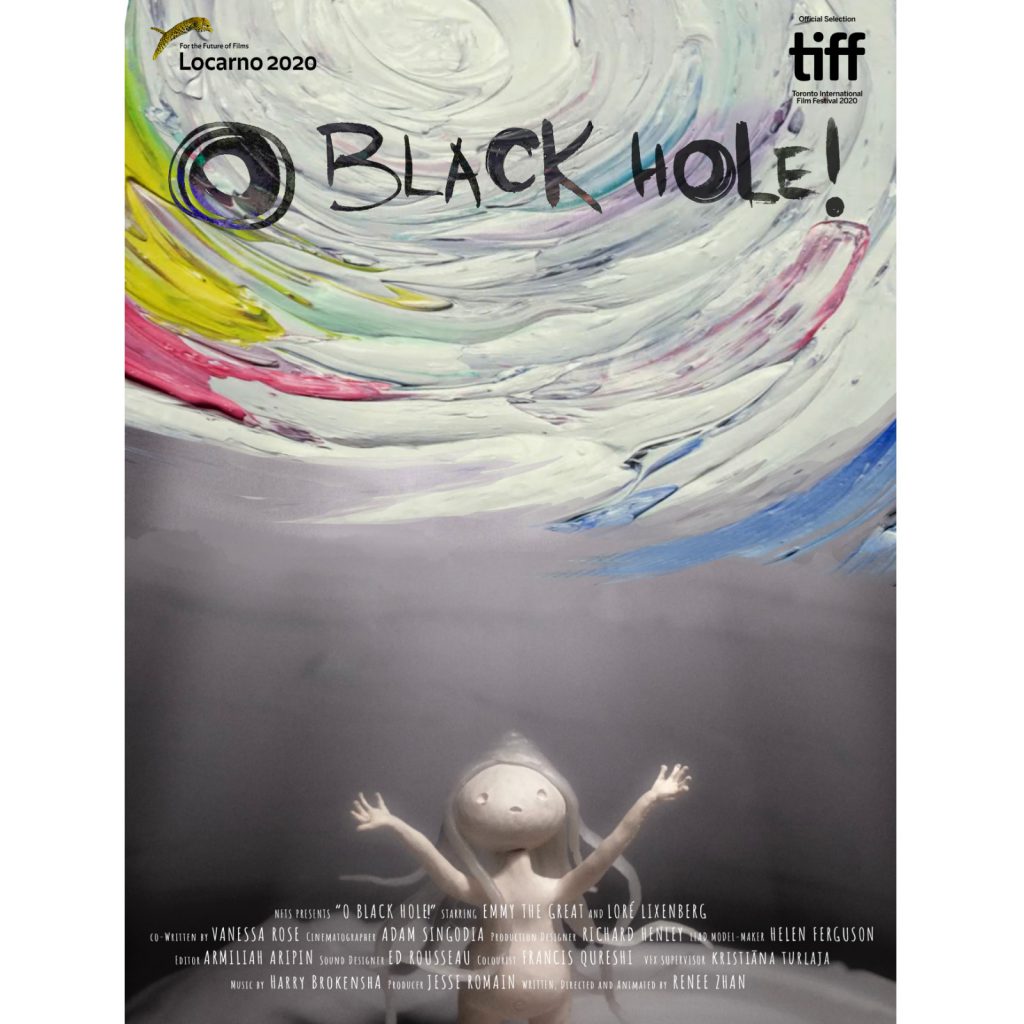reviewed by Isaac Fox

In Renee Zhan’s short film “O Black Hole!”, a woman (Loré Lixenberg) faces a very tragic, very commonplace question: How do I deal with the fact that everyone I love will one day die? Her answer is a little less commonplace: she becomes a black hole, sucking all that she cares about into the gravitational vortex where her head used to be. Everything from people to planets remains trapped in the timeless dark until the Singularity (Emmy the Great) wakes up inside her and sets off on a quest to “teach her how to say goodbye.”
Zhan uses several different visual mediums to craft the scenery of “O Black Hole!” Outside of the black hole, the world appears as two-dimensional charcoal on paper, with occasional watercolor backgrounds and washes of acrylic paint. Inside it, everything happens in stop motion. In both settings, color is uncommon, but whirling charcoal (when the black hole is shown from the outside) and a constant focus on light (on the inside) make the film vibrant and hard to look away from despite the lack of color in most scenes.
Unusually for a short film, “O Black Hole!” is a musical. Much of the dialogue is set to melody, and most of the spoken lines rhyme. This achieves a multitude of effects over the course of the film. In its early moments, a rhymed voiceover lends a fabulist aesthetic to the woman’s story. Later, when the three “vultures” finish each other’s rhymed sentences, speaking one-by-one and then in unison, some viewers may think of the three witches in Macbeth. As the Singularity restores life and freedom to everything trapped in the black hole, the liberated sing joyous, wordless hymns.
There are no clothes to be seen in “O Black Hole!”, and like the film’s music, its nudity serves numerous purposes. At the beginning of the film, the woman, naked among flowers during the mythic-feeling opening voiceover, projects an Eve-like innocence. Later, when the Singularity finds the humans in the black hole, they have lost their individuality. They have become archetypes of humanity that randomly repeat things the people in the woman’s life once said, but they are also ancient, animalistic beings. This primal nature, as well as their loss of identity, is represented visually: each is a grotesque mishmash of body parts.
At the climax of “O Black Hole!”, the woman-become-black-hole tells the Singularity, “I offered you eternity.” The Singularity’s response: “I’d rather be free.” The most radical thing about Zhan’s film has nothing to do with the visual mediums, the music, or the naked bodies: it’s her unwavering argument that even if we can cling on to each other and to life forever, we shouldn’t want to.
Isaac Fox is a student at Lebanon Valley College, where he majors in English and creative writing. He spends his free time reading and writing things that aren’t assigned, shooting pictures, and playing the clarinet. His fiction and photography have appeared in Rune Bear and Heart of Flesh magazines, as well as Green Blotter’s 2021 issue. You can find him on Twitter at @IsaacFo80415188.


